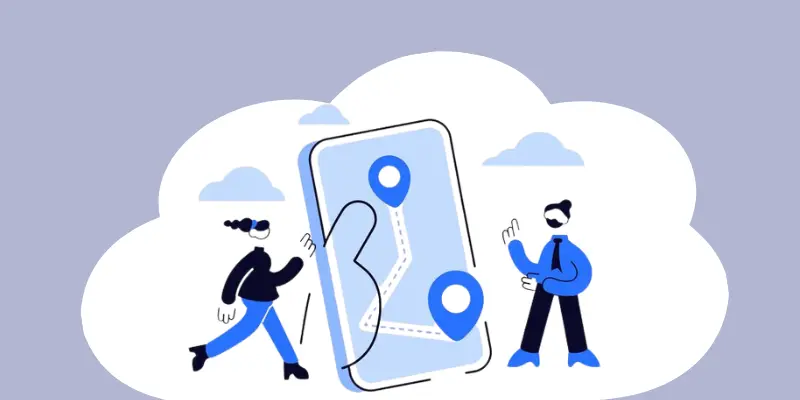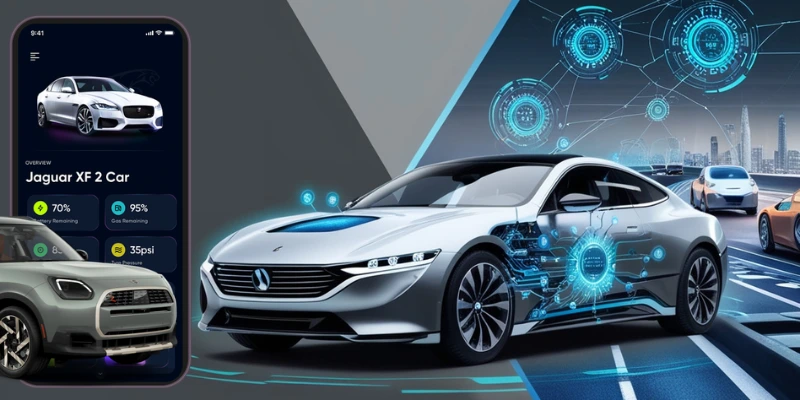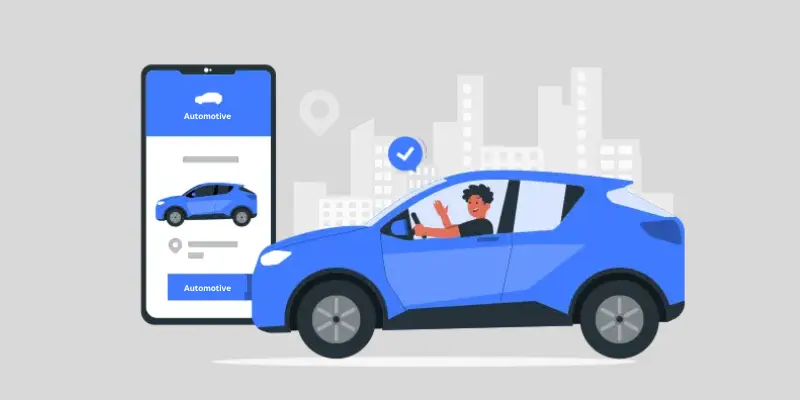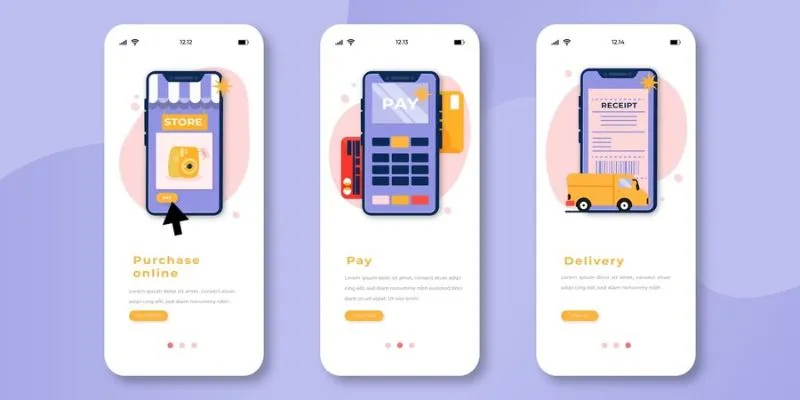The world of logistics is quite complex and it's not everybody's cup of tea to understand its workings in detail. The logistics business is all about cost-effectiveness and on-time delivery of services or products. However, route planning is a significant challenge that can impact the core operations of the business.
Fleet managers and drivers generally struggle to navigate through the complex web of roads and traffic while continuously changing the variables. It can be an enormous task and this is where route planner apps step in with their problem-solving issues.
Route planner apps make transportation more effective, ensuring the safety of drivers and consignment safety to offer job satisfaction to the delivery personnel. These apps optimize delivery routes to reduce travel time, fuel consumption, and vehicle wear, leading to a boost in ROI for your business.
Route app development is a multiple-step process that requires expertise and understanding of the topic. This blog will walk you through the different aspects of developing a route app including its cost-affecting factors, benefits, top features and the steps involved in its development. Let's dive deep into the interesting aspects of this topic.
Factors Affecting the Route Planner App Development Costs
Before deciding the budget of the project you need to understand various factors that influence its overall cost. Analysis and planning for each aspect are crucial to ensuring a seamless route planner app development process. Let's dissect each factor properly:
Features and Functionalities
The features and functionalities of your route planner app are the most significant factors that affect the development costs. The apps with basic features have turn-by-turn navigation, route planning, map integration, and user registration. On the other hand, advanced route planner apps have features like downloadable maps, multiple-stop routes, and real-time traffic updates, the total costs increase as more time and resources are needed.
In addition, custom features tailored to meet the needs of a specific user base, such as fleet management for logistics companies or cycling-oriented routes, also add a layer of complexity to the route planner app development and increase its costs.
Selection of Technology Stack
Choosing a technology stack is a crucial task as it directly influences the development cost or pace. Backend developers are responsible for installing servers, databases and APIs for managing data processing and storage. Moreover, if you use reliable and powerful route planner app development services like Firebase, AWS, or on-demand solutions also affect the cost of your app development project.
Library and framework selection is a thoughtful process as this will be the foundation of a responsive and user-friendly interface, making it a main goal of frontend development. Integrating dependable, scalable technologies ensures long-term performance and maintainability, even though it sometimes requires a higher initial cost.
Choice of Platform
Creating route planner app development solutions for a single platform whether it is for iOS or Android, is generally cheaper than developing a cross-platform solution. However, targeting both platforms simultaneously will boost your brand visibility on a higher level and broaden the user base.
Cross-platform frameworks like React Native or Flutter can enable parallel deployment on many platforms, which helps to lower some of the overhead costs. Additionally, to get native-like performance and an enhanced user experience across multiple platforms might lead to necessary updates and adjustments.
Third-Parties Integrations
A leading route planner app development company integrates third-party mapping and navigation services like Google Maps, Mapbox, or OpenStreetMap for smooth functionality. These integrations also add to the cost and increase the expense. Expensive testing is required to ensure the performance and compatibility of any API integration. In addition, they also add extra features like social media integrations, payment gateways and weather updates to offer an enhanced user experience.
Furthermore, managing various API connectors at the same time can be a difficult task, as it complicates updates and maintenance, which may lead to a rise in long-term expenses. It is very important to check that the security and compliance of these integrations strictly adhere to data privacy, which creates an additional layer of complexity and cost. Even though they increase costs, they are very significant for improved functionality and user experience.
User-Friendly Design
Investing in creating user-centric designs has its own benefits but it drives up your development expenses. A flawless user experience guarantees a vast, loyal and happy user base. Hire dedicated developers who can perform rigorous wireframing and user testing to deliver a well-designed app. Animations, appealing visuals and intricate design components together make up the complete front end of the app, which takes a lot of work and time to accomplish.
Take user feedback seriously while you are finalising your designs by using different procedures and extending the development timelines and budget. In addition, developing an intuitive and simple user interface that can work across various screens or devices can be challenging and time-consuming.
Moreover, accessibility and compliance with the design standards also contribute to the cost of the route scheduling app development. However, all these efforts are worth it to reach a broader audience and get long-term success.
Maintenance and Updates
Post-launch support is crucial to maintaining the app's performance and functionality. Identifying bugs and fixing them, optimising the performance, and upgrading for compatibility with the new versions of the operating systems should be part of routine maintenance. You can hire mobile app developers to integrate trending features into the ongoing development work, giving a modern and innovative touch to the app.
Deciding the maintenance and upgrading budget will ensure that the app will always be easy to use and competitive even after a long time after launch. Constant monitoring and correcting all the security flaws are must-have factors to earn the trust of the users.
Additionally, revamping and regularly updating the app would maintain its relevance with technological advancements. In other words, the cost of route planning app development gets directly influenced by app maintenance and support services.
Compliance and Security
A responsible route planner app development company like JPLoft always prioritises data security and regulatory compliance, especially those related to managing sensitive user data. Adding robust security features like encryption, secure authentication, and routine security assessments raises the expense of route scheduling software development. Following the GDPR or CCPA regulations facilitates advanced data security and user privacy protection.
These investments are essential since non-compliance might have negative legal effects and damage the app's reputation. Additionally, keeping up with evolving laws requires continual monitoring and changes, which raises long-term expenses even more. Comprehensive employee training and awareness campaigns are also necessary to maintain a secure environment by lowering the possibility of insider threats and human mistakes.
Location and Expertise of the Development Team
The location of the development team that you have hired for your project greatly impacts the expenses because the hourly rates of developers differ by region. If you decide to outsource your team to a mobile app development company located in Asian regions like India, then you may get the best-skilled professionals with their expertise in building solid back-end mobile app development solutions at optimised rate.
It is obvious that a highly experienced development team with strong portfolios would charge high rates in comparison to those with less experience. The development should be capable of streamlining your business ideas with the latest technologies to deliver high-quality products. Managing route planner app development expenses while ensuring expertise is key to achieving desired outcomes, making teams from areas such as Asia is an excellent option for optimizing value.
Benefits of Route Planner App Development
Route planner apps offer several advantages to several logistics businesses. They not only boost productivity but also reduce it while enhancing efficiency by optimizing routes and delivering real-time updates. Let's dive deep to understand the benefits of a route planner app.
Sustainable Initiative
Optimising routes will save you from going the extra mile, resulting in less fuel usage, which means a lower emission of pollutants. People are now well aware of eco-friendly initiatives and businesses can use this as an opportunity to showcase their environmentally friendly methods to improve their brand image. Technology-backed initiatives for sustainability allow people to come forward and join the worldwide trend for more eco-friendly business operations, which, in the marketplace, can have a significant impact.
Furthermore, expressing your dedication to sustainability might gain the attention of partners and investors who are concerned about the environment. Effective route planning also helps companies fulfil their corporate social responsibility (CSR) objectives by assisting them to follow industry guidelines and legal obligations regarding eco-friendly effects. Addressing sustainability proactively can facilitate route planner app development with unwavering support from stakeholders who place a high importance on taking environmentally friendly initiatives.
Smooth Workflow
Route planner apps help improve workforce management by giving proper instructions, timetables, and immediate changes. It will result in a high employee job satisfaction rate , increase their creativity and increase their accountability. If the workforce is managed properly, then it will definitely ensure that all the employees are performing well in their designated roles, thus increasing the efficiency of the operations.
In addition, real-time communication facilitates quick problem-solving responses, ensuring smooth operations. Every employee should feel visible and heard; it will help the managers make well-informed decisions and improve resource allocations. It enables businesses to reach a higher level of operational efficiency and boost employee morale by creating a nurturing and responsive work environment.
Operational Efficiency
A route planner app development solutions eases the logistics work and improves operational workflow by scheduling the routes for field work, deliveries and service calls. It saves travel time and fuel with the ideal optimisation of routes. Companies can complete more tasks in less time, increasing productivity and efficiency.
Moreover, optimised route planning eliminates the need for human interference. Real-time adjustments based on traffic patterns and other factors ensure that the user travels only through the best routes. This usually leads to reduced wait times, smoother operations, and a more adaptable response to changing conditions.
Enhanced Customer Satisfaction
Reliable and timely services are essential to keeping customers happy and satisfied. Route planner apps guarantee accurate and on-time deliveries of services, earning loyalty and reliability from customers. Hire software developers to integrate features like real-time tracking and updates to provide proper ETAs to its customers, fostering a sense of transparency in communication.
Furthermore, push notifications alert customers about changes, offers, discounts, etc. to eliminate the element of uncertainty in the services and improve their overall experience. Seamless route management quickly reduces potential delays or issues, saving customers time. In addition, maintaining consistency in providing the best services and exceeding customer expectations can boost retention rates and positive reviews, strengthening the business's reputation.
Scalability
As the business expands, the data piles up, and handling logistics becomes difficult. Route planner app development services help you overcome all the business challenges. It can handle higher demands, such as adding new cars, increasing delivery frequencies, or expanding service areas, without having significant operating problems.
With a growing business, you need scalable route planning software that can effectively control your logistics. A router planner app development company is well aware of the scalable technology that makes it possible to integrate other tools and systems easily for organised operations. This flexibility is beneficial for long-term growth and allows you to stay ahead of the curve by staying flexible and relevant to the changes in the market.
Safety Features
Route planner apps make you follow all the transportation regulations, enhancing business safety. The app's features like driver log books, compliance tracking, and automated reporting, help you adhere to legal standards. Maintaining a great safety record is made possible by optimized routing, which lowers driver stress and exhaustion and encourages safer driving practices and fewer accidents.
Resource Optimization
Customised route planning ensures that resources are being used carefully including fuel, vehicles and drivers. This allows businesses to accomplish their goals with fewer resources, eliminating the need for additional investments in fleet expansion. Optimising resource utilisation lets you manage operations more effectively in a streamlined manner.
In addition, profit margins can be increased and significant cost reductions can be achieved with efficient resource management. Additionally, the improved processes reduce waste and help with sustainability projects. Businesses can more successfully increase operations and respond to market needs by making the most of their current assets.
Also Read : How Much Does Automotive Software Development Cost In 2024?
Must-have Features to Elevate the Working of Route Planner Apps
Route planner apps are always feature-rich and designed to ease logistics and improve navigation. Let's explore some of the main features of the route planner app development solutions that make it robust.
Real-Time Traffic Updates
It provides real-time traffic conditions and updates to optimize routes and avoid delays.
Multiple Route Options
These apps offer various route choices based on different criteria like shortest distance, fastest time, or scenic routes.
Turn-by-Turn Navigation
It gives step-by-step directions with voice guidance to ensure users follow the correct path.
Offline Maps
It allows users to download and access maps without an internet connection, which is useful for areas with poor network coverage.
Route Optimization
Route scheduling apps calculate the most efficient route considering factors like traffic, road closures, and user preferences.
Customizable Routes
Lets users add waypoints or detours to tailor routes to their specific needs.
Destination Search
Route Planner app development includes a robust search feature to find destinations, points of interest, and addresses easily.
User Preferences
Allows customization of navigation preferences such as avoiding tolls, highways, or ferries.
Real-Time ETA Updates
Provides estimated arrival times that adjust based on current traffic conditions and route changes.
Integration with Calendar and Contacts
Syncs with users' calendars and contact lists to schedule and plan routes for upcoming events or meetings.
Fuel and Rest Stops
Suggests locations for fuel and rest breaks along the route, especially for long-distance trips.
Safety Alerts
Sends notifications about potential hazards, speed limits, and road conditions to ensure safe travel.
Multi-Modal Transportation Options
Supports various modes of transportation like driving, walking, cycling, and public transit.
Real-Time Sharing:
Allows users to share their route and ETA with friends or family for safety and coordination.
User Feedback and Ratings:
This enables users to rate and review routes and provide feedback on map accuracy and navigation.
Voice Commands
Supports voice control for hands-free operation while driving.
Dynamic Rerouting
Automatically adjust routes if unexpected changes or obstacles are encountered.
Weather Updates
Provides current and forecasted weather conditions to help users prepare for travel.
Fleet Management:
Provides tools to monitor and manage multiple vehicles within a fleet, offering insights into their locations, routes, and statuses to optimize overall fleet efficiency.
Vehicle Maintenance Alerts
Sends notifications and reminders for scheduled maintenance tasks, such as oil changes or tire checks, to reduce the risk of breakdowns.
Analyzing Historical Data:
Offers analytics and reporting features that review past routes, travel times, and vehicle performance to identify trends, improve route planning, and make data-driven decisions.
Geofencing:
Allows users to set virtual boundaries around specific geographic areas. The app can trigger alerts or notifications when a vehicle enters or exits these predefined zone
Emergency Support:
Provides quick access to emergency services or support in case of breakdowns, accidents, or other urgent situations, ensuring prompt assistance and enhancing safety.
Cost Estimation:
Calculates and provides estimates for various travel-related expenses, including fuel consumption, tolls, and overall trip costs, helping users manage travel expenses.
Environmental Impact Reports:
Generates reports on the environmental impact of travel routes to promote eco-friendly practices and help users make greener choices.
Also Read : How Much Does Automotive Software Development Cost In 2024?
Steps to Build a Route Planner App
From ideal to final deployment, route scheduling app development involves multiple steps that need to be executed perfectly to achieve the desired results. Each phase requires an adequate amount of assistance and expertise to align with the user's needs and business goals. Let's look at the steps of route planning app development:
Ideation and Planning
Ideation and planning mark the first phase of the development process. It includes determining the concept, goal, target market and key features of the app. In this step, you should conduct in-depth market research to know the current market scenarios and evaluate your competitors also. After determining what features are required, move on to determining the technical functionalities of the application.
UI/UX Design
In this phase, the UI/UX designers of the hired app development team create wireframes to showcase the apps' layout and navigation. It will allow you to give your early feedback so that they can make the change in the design accordingly. Both, the user experience (UX) and the user interface (UI) should be intuitive and engaging, resulting in a better experience when planning the tasks. It is important to check the accessibility and responsiveness of the app, ensuring it can work on various screens and devices.
App Development
Real development starts in this phase, where developers start to write code for the app. The route planner app development process involves both backend and frontend development.
The front-end development consists of creating a user-friendly interface based on the design specifications. On the other hand, backend development ensures third-party integration for smooth functioning and robust data management. Add all the essential elements to offer a smooth and effective user experience.
Regular Testing
Perform rigorous testing to ensure the usability, performance, security, and compatibility of the app across multiple devices and operating systems. Find and address any problems or faults to ensure a perfect customer experience. In addition to this, conduct user acceptance testing (UAT) to gather real user feedback and optimize app performance. This extensive testing procedure guarantees that the application meets high requirements and offers a satisfying user experience.
Deployment and Launch
In this phase of the route planner app development process, the app is deployed to the App Store or Play Store, ensuring it caters to the requirements and has all the essential documentation related to privacy policies.
Developing and executing a strong marketing plan is also essential to generate excitement and draw users to the launch. The app's first reception and future success are determined during the launch period, which is crucial. Keep an eye on post-launch performance and collect customer input to inform future improvements and updates. To ensure continued success and sustain growth, stay active in app stores and interact with users.
Maintenance and Support
After the app launches, it's critical to keep an eye out for any issues or bugs to ensure a flawless user experience. Additionally, route planner software development needs to be updated and maintained on a regular basis, with new features and improvements added in response to user feedback and industry advancements. Iterative development keeps the app current and competitive, which enhances its functionality and user experience.
In The Bottom Line
Start your route planner app development journey with the tech professionals at JPLoft, who are experts in offering logistics software development services. We are known for transforming businesses with a blend of innovation and technology. We develop powerful and user-centric applications that improve operating efficiency and simplify logistics. Working with our seasoned experts gives you access to a group of people who are dedicated to delivering excellence.
Maintaining a responsive support network and promptly addressing customer concerns can also contribute to improving the app's functioning and reputation. We can guarantee that the app will continue to be a helpful and enjoyable resource for users by giving maintenance and updates top priority.












Share this blog